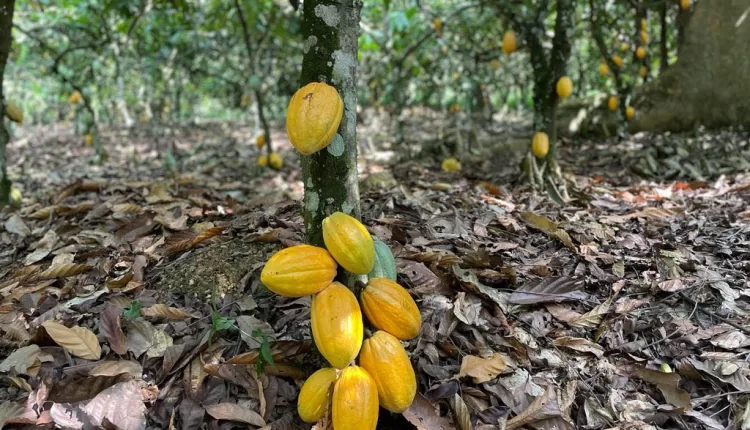The Ghana Agricultural Rural Development Journalists Association (GARDJA) has proposed the resourcing of the media in Ghana to highlight the country’s progress in combating child labour in cocoa production.
The Project Coordinator of GARDJA, Nana Yaw Reuben, made the recommendation on the back of the rising incidence of “staged” cocoa child labour reportage by foreign journalists.
He insisted that the time was ripe for the country and its partners in the cocoa sector to partner with the media to highlight the impact stories of years of investment into programmes to combat the incidence of child labour in cocoa production.
“These foreign journalists who have been resourced by some organisations come under the pretence of studying the country’s progress in the cocoa sector but end up staging child labour reports to affect our international relations.
“As it stands, we as journalists have seen a lot of improvement the government has achieved in clamping down the rate of child labour, especially in the cocoa sector, but lack the resources to conduct such reportage,” he observed.
He added, “We need to let the international bodies know the type of investment the government has made in addressing the issue, and this can be made possible if they resource journalists to undertake such reports.”
Reuben noted that, in the absence of such a deliberate strategy of impact storytelling, some foreign journalists with funding from unknown sources are having a field day churning out documentaries of staged incidents of child exploitation in cocoa production to dent Ghana’s image.
Last year, the West African nation called out Al Jazeera, a Qatar-based international news channel, for its “stage-managed” documentary, accusing Ghana of engaging children on cocoa farms.
The perception of child labour in cocoa production has over the years put Ghana’s reputation as a major cocoa producer in the world at risk, leading to negative publicity that has damaged the country’s image on the global stage.
International partners on various occasions have raised issues concerning human rights in Ghana’s cocoa sector, as they have strict policies against sourcing products from suppliers that use child labour.
According to GARDJA, the fake child labour documentaries being perpetrated by these foreign news networks pose a negative long-term economic effect on the economy and the livelihood of smallholder cocoa farmers.
This situation, it warned, could get worse if trade partners decided to reduce their cocoa sourcing from Ghana due to concerns about child labour, which can lead to a decline in revenue for farmers and the country.
He explained that such concerted reportage will also inform the government whether it has achieved the target of zero involvement of children in cocoa production or not to inform its next action plan, while emphasising the importance of informing international bodies about the government’s efforts and achievements in combating child labour.
Meanwhile, the government, through the Ghana Cocoa Board, has embarked on numerous child labour sensitization activities and, in some cases, arrested offenders for breaches of the country’s labour and child protection laws.
These activities, done with the support of partner agencies, engage cocoa farmers on the negative impacts of involving children in cocoa production and are targeted at drastically reducing the practice across cocoa-growing communities in the country.
Nana Yaw Reuben intimated GARDJA’s position at a just-ended 5-day Human Rights Due Diligence training programme organised by Rainforest Alliance in partnership with the International Cocoa Initiative and Solidaridad, with funding support from the Norwegian Agency for Development Cooperation (NORAD).
The training was part of Rainforest Alliance’s larger projects aimed at combating forced and child labour in cocoa and mining communities with the use of the HRDD tool, which is meant to guide and support the implementation of human rights due diligence to protect children and vulnerable individuals against forced and child labour.
The lead coordinator of the workshop, Suzan Yemidi, said the National Plan of Action report suggests that one out of five children (20%) are in child labour in Ghana, with the majority in farming.
This, she said, forms the reason why the Rainforest Alliance initiated the HRDD training programme to provide relevant information on the nature and impact of human rights issues, including child labour, forced labour, and gender discrimination in the cocoa and gold sectors.
“The HRDD programme was initiated to eradicate the child labour menace in Ghana’s cocoa sector. We provide cooperatives, farmers, and gold mining associations with free tools and training to prevent, identify, and address child labour and forced labour, taking into account the situation and risks of women, men, girls, and boys,” she said.
- Resource Media to Project Ghana’s Progress on Child Labour - March 11, 2024
- Ghana Startups to Get Direct Cocoa Beans Supply This Year - February 2, 2024
- How SOCODEVI is Helping Bridge Gender Gaps in Cocoa Communities - February 1, 2024
